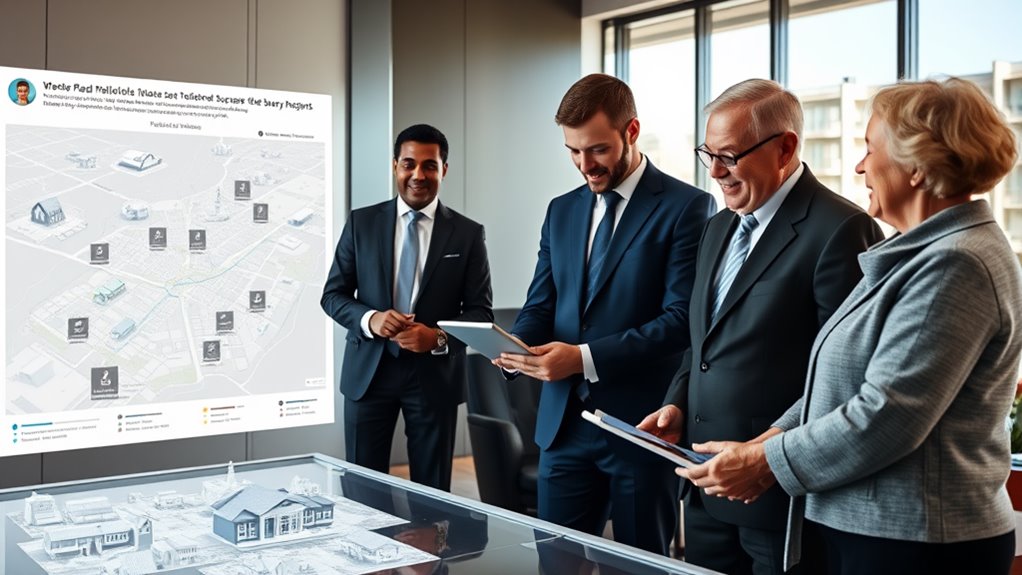You’ll need hyper-personalized innovative real estate marketing campaigns to target buyers with tailored messages, boosting engagement by 20%. Leverage predictive analytics to identify high-potential leads, cutting acquisition costs by 40%. Host educational workshops and partner with local businesses to build trust and amplify reach. Use advanced virtual tours and 3D walkthroughs to sell properties 31% faster. Integrate AI for 24/7 client support and streamlined workflows. Discover how these strategies can transform your real estate game in 2025.
Key Takeaways
- Leverage AI-driven predictive analytics to identify high-potential leads and forecast market trends for proactive outreach.
- Create hyper-personalized campaigns using dynamic content like tailored property videos and neighborhood guides.
- Host educational workshops and partner with local businesses to build trust and amplify community engagement.
- Utilize advanced virtual tours and 3D walkthroughs to enhance buyer engagement and reduce decision time.
- Develop tailored programs for specific buyer segments, such as first-time homebuyers and luxury buyers, to meet unique needs.
Innovative Real Estate Marketing Campaigns
As buyer expectations evolve, hyper-personalized marketing campaigns are becoming essential for real estate success. You need to leverage predictive analytics to identify and understand your target market on a granular level. By analyzing data such as property preferences, location trends, and budget ranges, you can craft tailored messages that resonate with potential buyers. AI-driven insights allow you to segment your audience effectively, guaranteeing your CRM tools deliver customized emails, ads, and property recommendations. Incorporate dynamic content like personalized property videos or neighborhood guides, which boost engagement by 20% compared to generic approaches. Predictive analytics also helps you anticipate potential sellers by examining equity growth or life stage changes, enabling proactive outreach. With 72% of consumers only engaging personalized content, hyper-personalized campaigns secure you’re meeting buyer demands while standing out in a competitive market. Focus on precision and relevance to drive meaningful connections and conversions. Utilize behavioral targeting to time your messages perfectly and increase the likelihood of engagement.
Leveraging Predictive Analytics for Lead Generation
To stay ahead in real estate, you’ll need to harness predictive analytics to transform lead generation into a strategic advantage. By analyzing data trends like length of ownership, equity growth, and life events, you can identify potential sellers before they even list. AI-driven predictive models forecast market shifts, allowing you to target leads proactively, increasing conversion rates by 20-30%. This approach not only reduces lead acquisition costs by up to 40% but also guarantees your outreach is hyper-relevant. Integrating tenant screening solutions into your predictive models ensures you attract financially reliable buyers or renters, further enhancing your lead quality.
- Identify high-equity homeowners: Predictive analytics pinpoints those most likely to sell, giving you a competitive edge.
- Anticipate market trends: Stay ahead of shifts by leveraging data to predict when and where demand will spike.
- Optimize marketing spend: Focus resources on leads with the highest conversion potential, maximizing ROI.
Hosting Educational Workshops and Neighborhood Updates
Host community engagement events like free homeowner equity workshops to empower sellers with actionable insights while fostering trust. Pair these with local market insights sessions featuring hyper-targeted video updates showcasing neighborhood trends, increasing visibility and urgency. Partner with local businesses to co-host events, amplifying your reach and solidifying your role as the go-to real estate expert in the area. Highlight how vacancy rates remain low at around 4% nationally, emphasizing strong rental demand and opportunities for sellers.
Community Engagement Events
While traditional marketing methods have their place, community engagement events like educational workshops and neighborhood updates can substantially amplify your real estate outreach. By investing $1,000 in these events, you can yield a 10X return, making them a cost-effective strategy. Neighborhood updates shared at these events increase local engagement by up to 40%, while workshops on home equity or market trends position you as a trusted local expert, attracting 30% more seller inquiries. Properties marketed through community events sell 15% faster due to increased word-of-mouth referrals. Local outreach fosters brand awareness and strengthens connections with current and future residents.
- Build Trust: 82% of customers trust brands more after attending their educational events.
- Boost Engagement: Regular neighborhood updates foster deeper local connections.
- Position Authority: Educational workshops establish you as a go-to Real Estate Agent in your area.
Local Market Insights Sessions
As the real estate landscape evolves, hosting local market insights sessions quarterly guarantees your clients stay ahead of neighborhood-specific trends and property value shifts. Leverage MLS and local government data to present accurate statistics on home prices and market activity, ensuring your audience receives reliable information. Incorporate interactive Q&A segments to address concerns, fostering trust with prospective buyers and sellers. Highlight key local amenities, school districts, and traffic patterns to provide an encompassing view of the area. Collaborate with local businesses and experts like mortgage brokers or home inspectors to add value, turning these sessions into must-attend events. By offering market insights and connecting clients with local professionals, you’ll position yourself as a trusted resource while driving engagement in the local market. Optimizing your Google My Business profile during these sessions can further enhance your local search visibility and attract more potential clients.
Building Strategic Partnerships With Local Businesses
To maximize your real estate agency’s impact in 2025, you’ll need to forge strategic partnerships with local businesses that align with your clients’ needs. Partner with local contractors and interior designers to offer home improvement packages that enhance property appeal for sellers. Collaborate with moving companies to provide relocation deals, adding value for clients who list their homes through your agency. Joint events with local coffee shops or bakeries can boost community engagement while attracting potential sellers. Additionally, coordinate with landscaping services to highlight curb appeal enhancements as a value-add for sellers. Cross-promote with local furniture stores to emphasize staging benefits, giving sellers a competitive edge. Local partnerships can also enhance your brand reputation and foster meaningful connections within the community.
- Data-driven partnerships: Align with businesses that offer measurable benefits, like increased property value or relocation efficiency.
- Creative collaborations: Leverage community spaces to host events that blend networking with marketing.
- Strategic value-adds: Bundle services like staging and landscaping to differentiate your listings in a competitive market.
Tailored Programs for Specific Buyer Segments

Leverage demographic targeting to craft niche programs like a “First-Time Homebuyer Bootcamp” for millennials and Gen Z or a “Luxury Lifestyle Program” for high-net-worth individuals. Use geographic segmentation to design initiatives such as a “Relocation Assistance Program,” offering hyper-local insights to corporate transferees. Capitalize on behavioral insights to create offerings like a “Fixer-Upper Financing Plan” for DIY enthusiasts, aligning their passion for renovation with tailored financial solutions. Incorporate income segmentation to ensure your programs meet the specific financial needs and preferences of each target audience.
Demographic Targeting
Understanding your audience’s unique needs is essential for crafting effective real estate marketing strategies. Tailor your approach by segmenting buyers into distinct demographics, ensuring your campaigns resonate deeply. For first-time homebuyers, offer educational workshops and flexible financing options to ease their entry into the market. Millennial buyers respond well to social media-driven campaigns and incentives like smart home technology, aligning with their tech-forward lifestyles. Meanwhile, luxury buyers demand exclusivity—think private property previews, high-end virtual tours, and concierge services that cater to their refined tastes. Highlighting unique property features can significantly enhance your property’s appeal across all demographics.
- First-time homebuyers: Focus on education and financial support to build trust.
- Millennial buyers: Leverage digital platforms and tech incentives to capture their attention.
- Luxury buyers: Deliver personalized, premium experiences to meet their high expectations.
Geographic Segmentation
As markets evolve, geographic segmentation becomes a cornerstone of real estate marketing, enabling you to craft hyper-localized strategies that align with buyer preferences. By focusing on specific neighborhoods, you can analyze local housing trends, demographics, and economic factors to create hyperlocal marketing campaigns that resonate deeply. Use geofencing technology to send targeted ads or notifications to potential buyers when they enter best neighborhoods, capturing their interest at the right moment. Highlight neighborhood-specific amenities, schools, and lifestyle features in your materials to address what buyers value most in a location. This approach allows you to concentrate resources on high-demand areas, optimizing your marketing budget and increasing conversion rates. Geographic segmentation guarantees your strategies are data-driven, precise, and tailored to the unique characteristics of each market.
Behavioral Insights
Geographic segmentation lays the groundwork for localized strategies, but behavioral insights refine them further. By leveraging AI-powered predictive analytics, you can identify high-potential sellers and target likely movers based on equity growth or life events. Tailored programs for first-time buyers, like educational resources and financial planning tools, help you connect with potential clients more effectively. For retirees, offering incentives such as relocation assistance or maintenance discounts guarantees your messaging resonates. Personalized email campaigns for repeat buyers, shaped by their transaction history, deepen engagement. Luxury buyers respond to materials highlighting exclusivity and privacy, maximizing their target potential.
- Predictive analytics: Pinpoint sellers using key indicators like length of ownership.
- Custom programs: Design solutions for first-time buyers and retirees.
- Personalized campaigns: Use transaction data to connect with repeat and luxury buyers.
Advanced Virtual Tours and 3D Walkthroughs
While traditional photos have long been a staple in real estate marketing, advanced virtual tours and 3D walkthroughs are revolutionizing how buyers engage with properties, boosting engagement by up to 40%. These visual tools allow potential buyers to explore every corner of a property remotely, with 87% finding them essential for narrowing down choices before visiting in person. By integrating 3D walkthroughs, you’ll see properties sell 31% faster on average, as immersive content builds trust and reduces decision-making time. Virtual tours also cut in-person showings by 50%, streamlining the process for both agents and buyers. With 360-degree tours accessible on 95% of mobile devices, you’re meeting buyers where they are—on their phones. Leveraging these tools not only enhances the buyer experience but also positions your listings as modern and tech-savvy, giving you a competitive edge in 2025’s dynamic real estate market.
Integrating AI and Automation in Marketing Efforts
Building on the immersive power of virtual tours, integrating AI and automation into your real estate marketing can elevate efficiency and precision. AI-powered chatbots let you handle client inquiries 24/7, cutting response times by up to 80%, guaranteeing no lead slips through the cracks. Predictive analytics tools identify potential sellers with 90% accuracy by analyzing equity growth and ownership duration, allowing you to target high-conversion prospects. Automated listing platforms streamline workflows, generating property descriptions and marketing materials in under 5 minutes, freeing you to focus on strategy. These tools not only save time but also enhance decision-making and client engagement.
- AI-powered chatbots guarantee instant, personalized responses, boosting client satisfaction.
- Predictive analytics tools uncover hidden opportunities, refining your lead generation.
- Automated listing platforms eliminate manual tasks, accelerating your marketing process.
Frequently Asked Questions
What Are the Marketing Trends in 2025 for Real Estate?
You’ll leverage AI chatbots for instant buyer interactions, use drone photography to showcase properties from unique angles, and integrate virtual tours to provide immersive experiences, ensuring your listings stand out in a competitive 2025 market.
What Are the 4 P’s of Marketing in Real Estate?
In real estate, you’ll master product placement by highlighting unique features and location appeal. You’ll craft pricing strategies tied to market trends and buyer demand. You’ll deploy promotional tactics like targeted campaigns to maximize visibility.
What Type of Marketing Is Best for Real Estate?
Focus on social media ads for lead generation, boost engagement with video tours, and enhance listings using virtual staging. These methods drive 70% higher engagement and 90% of real estate leads in 2025.
What Do Most Realtors Struggle With?
You’ll find most realtors struggle with lead generation, with 73% citing it as their top challenge. They also face difficulties in client retention, time management, and differentiating services, with financial constraints further limiting effective strategies.
Conclusion
Imagine your real estate strategy as a garden. In 2025, you’ll plant hyper-personalized campaigns and nurture predictive analytics for flourishing leads. Workshops and neighborhood updates become your sunlight, strategic partnerships the fertile soil. Tailored programs bloom for diverse buyer segments, while advanced virtual tours paint vibrant landscapes. With AI and automation as your steady rain, growth is inevitable. Cultivate these strategies, and watch your success blossom into a thriving ecosystem of opportunity.




